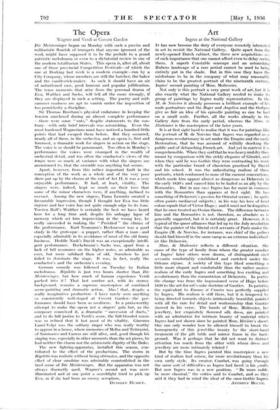The Opera
Wagner and Vcrdi at Covent Garden Die Meistersinger began on Monday with such a precise and militaristic flourish of trumpets that anyone ignorant of the work might have supposed it to be the prelude to a grand patriotic melodrama or even to a dictatorial review in one of the modern totalitarian States. This opera is, after all, about one of those provincial Competition Festivalsof which the One at. Dorking last week is a modern example—run by a City, company, whose members are still the butcher, the baker and the candlestick-maker. As such it should have an air of unbuttoned ease, good humour and popular jollification. The tense moments that arise from the personal drama of Eva, Walther and Sachs, will tell all the more strongly, if they are displayed in such a setting. The poetry and mid- summer madness are apt to vanish under the imposition of too pernicketty a discipline.
Sir Thomas Beecham's physical endurance in keeping the tension unrelaxed during an almost complete performance —there were some " cuts," despite statements to the con- trary—with only brief intervals was astonishing. Even the most hardened Wagnerians must have noticed a hundred little points that had escaped them before. But they occurred, nearly all of them, in the orchestra, and an opera is, first and foremost, a dramatic work for singers in action on the stage. The voice is or should be paramount. Too often in Monday's performance the voices were swamped in the wealth of orchestral detail, and too often the conductor's views of the tempo were so much at variance with what the singers arc accustomed to, that the ensemble was anything but secure.
Apart, however, from this rather important fault in the conception of the work as a whole and of the very poor show put up by the chorus at the end of Act II, it was a very enjoyable perforinance. It had, at least, vitality. The singers were, indeed, kept so much on their toes that some of the minor characters were, if anything, inclined to overact. Among the new singers, Tiana Lemnitz created a favourable impression, though I thought her Eva too little ingenue' and her voice has not quite enough edge to its tone. Torsten Ralfs Walther is certainly the best we have heard here for a long time and, despite his unhappy lapse of memory which set him improvising in the wrong key, lie really succeeded in making the " Preislied " the eliniax of the performance. Karl Neumann's Beckmesser was a good study in the grotesque—a puppet, rather than a man—and especially admirable in its avoidance of most of the old funny business. Heddlc Nash's David was an exceptionally intelli- gent performance. Boekelmann's Sachs was, apart from a lack of full resonance on the higher notes, as admirable as ever, but more subdued than of old. Somehow he just failed to dominate the stage. It was, in fact, really the conductor's and the orchestra's evening.
German comedy was followed on Tuesday- by Italian melodrama. Rigoletto is just two hours shorter than Die Meistersinger, but how much of human experience Verdi packed into it ! That last sombre act, with its stormy background, remains a supreme masterpiece of combined scene-painting and dramatic action. Alas ! that, despite a •
really imaginative productionI have rarely seen anything ''so consistently well-staged at Covent Garden—the per- formance should have been so mediocre. In a praiseworthy attempt to make the opera not a singers' gala but, as the composer conceived it, a dramatic succession of duets," and to do full justice to Verdi's score, the full-blooded music was so refined that it lost most of its vitality. Giacomo Lauri-Volpi was the solitary singer who was really worthy to appear in a house, where memories of Melba and Tettrazini, of Sammareo and Caruso are still alive, and, good though his singing was, especially in other moments than the set pieces, he had neither the charm nor the aristocratic dignity of the Duke.
The new lighting-apparatus, installed this season, con- tributed to the effect of the productions. The storm in Rigoletto was realistic without being obtrusive, and the opposite effect of clear sunshine was admirably counterfeited in the final scene of Die Meistersinger. But the apparatus was not always discreetly used. Wagner's second act was over- illuminated and at one point a searchlight tried to pick up
Eva, as if she had been an enemy aeroplane. • -
DYNELEY 14USSEY.














































 Previous page
Previous page